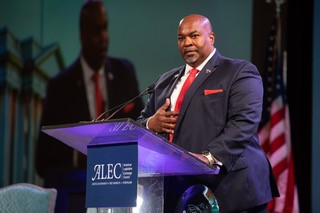Continuing the Celebration of Black History Month
As we wrote about last week, since 1976, Americans have celebrated Black History Month every February to highlight African American achievements and contributions to the United States.
As the first black American elected Lieutenant Governor of North Carolina, Lt. Governor Mark Robinson truly embodies the opportunity that all Americans enjoy today, having grown up in poverty in a family with 10 children. At the 48th ALEC Annual Meeting last year, Lt. Governor Robinson began his remarks with the following statement:
The United States of America is still the nation where dreams come true. It is still the freest nation on earth. It is still the land of opportunity. But the United States can only remain the land of opportunity if we have elected officials who understand the motto of [ALEC]: limited government, free markets, and federalism.

At ALEC, we are committed to providing policy solutions for all Americans. We take pride in working side-by-side with state legislators from all walks of life, helping them identify best practices that lead to growth and opportunity. As Black History Month continues, we are excited to highlight the final two sections of The ALEC Opportunity Agenda: Affordable Healthcare and Safety & Justice.
AFFORDABLE HEALTHCARE
- Resolution in Support of Telehealth Modernization Principles – Health care providers should be allowed to practice to the full extent of their professional training through telehealth. Laws and regulations should allow telehealth innovations such as real-time video consultations, remote patient monitoring, and store-and-forward technology. Telehealth services ought to be available to patients who want to access their healthcare provider if their provider is in another state so long as the provider is fully licensed and trained.
SAFETY & JUSTICE
- Statement of Principles on Policing and Community Engagement – The American Legislative Exchange Council (ALEC) is strongly committed to expanding opportunity for all, understanding that no individual should feel threatened or be treated differently based on the color of their skin. Fairness, justice, equal protection and safety within our criminal justice system, and in communities, are the only means for protecting and serving all Americans.
- A Bill to Ban the Box on Employment Applications – This model declares that it is the duty of states to encourage and contribute to the successful reintegration of people with a criminal history. The ability to procure meaningful employment is essential to reinstating good citizenship. The model seeks to reduce barriers to employment for persons with a criminal history in order to reduce recidivism and improve community stability.
- Resolution on Diversion of Low-Level Drug Possession Offenders – This model recognizes that many of those arrested for possessing small amounts of drugs are struggling with addiction and that prison is often an ineffective intervention, which is also extremely costly to taxpayers. Accordingly, this model urges states to adopt policies that promote the diversion of low-level drug possession offenders from prison and into alternatives such as drug courts and drug treatment programs required as a condition of probation.
- Recidivism Reduction Act – Research and practice over the past 25 years have identified new strategies and policies that can make a significant dent in recidivism rates. Implementing these research-backed programs and procedures is called “evidence-based practice.” This Act requires that a to-be-determined percent of offenders be supervised in accordance with evidence-based practices within four years, as well as that a to-be-determined percent of state funds for offender programming be spent on programs that are evidence-based within four years.

